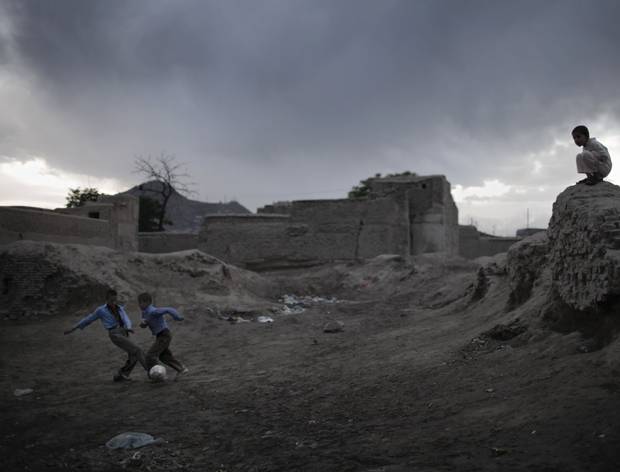The Independent
November 1, 2013

With the looming withdrawal of Nato troops and a persistent insurgent threat, Afghanistan is in a precarious position. Innumerable tragedies have beleaguered rural Afghans throughout the past decades of conflict — perpetual violence, oppression of women, and crushing poverty have all contributed to the Hobbesian nature of life in the Afghan countryside.
While the Afghan government has been able to address some of these issues since the Taliban’s ouster in 2001, archaic social traditions and deep-seated gender norms have kept much of rural Afghanistan in a medieval state of purgatory. Perhaps the most deplorable tragedy, one that has actually grown more rampant since 2001, is the practice of bacha bazi — sexual companionship between powerful men and their adolescent boy conscripts.
This phenomenon presents a system of gender reversal in Afghanistan. Whereas rural Pashtun culture remains largely misogynistic and male-dominated due to deeply-ingrained Islamic values, teenage boys have become the objects of lustful attraction and romance for some of the most powerful men in the Afghan countryside.
Demeaning and damaging, the widespread subculture of paedophilia in Afghanistan constitutes one of the most egregious ongoing violations of human rights in the world. The adolescent boys who are groomed for sexual relationships with older men are bought — or, in some instances, kidnapped — from their families and thrust into a world which strips them of their masculine identity. These boys are often made to dress as females, wear makeup, and dance for parties of men. They are expected to engage in sexual acts with much older suitors, often remaining a man’s or group’s sexual underling for a protracted period.
Evolution of Bacha Bazi
Occurring frequently across southern and eastern Afghanistan’s rural Pashtun belt and with ethnic Tajiks in the northern Afghan countryside, bacha bazi has become a shockingly common practice. Afghanistan’s mujahideen warlords, who fought off the Soviet invasion and instigated a civil war in the 1980s, regularly engaged in acts of paedophilia. Keeping one or more “chai boys,” as these male conscripts are called, for personal servitude and sexual pleasure became a symbol of power and social status.
The Taliban had a deep aversion towards bacha bazi, outlawing the practice when they instituted strict nationwide sharia law. According to some accounts, including the hallmark Times article “Kandahar Comes out of the Closet” in 2002, one of the original provocations for the Taliban’s rise to power in the early 1990s was their outrage over paedophilia. Once they came to power, bacha bazi became taboo, and the men who still engaged in the practice did so in secret.
When the former mujahideen commanders ascended to power in 2001 after the Taliban’s ouster, they brought with them a rekindled culture of bacha bazi. Today, many of these empowered warlords serve in important positions, as governors, line ministers, police chiefs and military commanders.
Since its post-2001 revival, bacha bazi has evolved, and its practice varies across Afghanistan. According to military experts I talked to in Afghanistan, the lawlessness that followed the deposing of the Taliban’s in rural Pashtunistan and northern Afghanistan gave rise to violent expressions of paedophilia. Boys were raped, kidnapped and trafficked as sexual predators regained their positions of regional power. As rule of law mechanisms and general order returned to the Afghan countryside, bacha bazi became a normalized, structured practice in many areas.
Many “chai boys” are now semi-formal apprentices to their powerful male companions. Military officials have observed that Afghan families with an abundance of children are often keen to provide a son to a warlord or government official — with full knowledge of the sexual ramifications — in order to gain familial prestige and monetary compensation. Whereas bacha bazi is now largely consensual and non-violent, its evolution into an institutionalized practice within rural Pashtun and Tajik society is deeply disturbing.
Pedophilia and Islam
The fact that bacha bazi, which has normalized sodomy and child abuse in rural Afghan society, developed within a deeply fundamentalist Islamic region of the world is mystifying. According to a 2009 Human Terrain Team study titled “Pashtun Sexuality,” Pashtun social norms dictate that bacha bazi is not un-Islamic or homosexual at all — if the man does not love the boy, the sexual act is not reprehensible, and is far more ethical than defiling a woman.
Sheltered by their pastoral setting and unable to speak Arabic — the language of all Islamic texts — many Afghans allow social customs to trump religious values, including those Quranic verses eschewing homosexuality and promiscuity. Warlords who have exploited Islam for political or personal means have also promulgated tolerance for bacha bazi. The mujahideen commanders are a perfect example of this — they fought communism in the name of jihad and mobilized thousands of men by promoting Islam, while sexually abusing boys and remaining relatively secular themselves.
